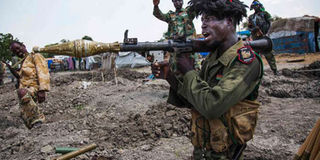Governments must act to end suffering in S. Sudan

Soldiers of the Sudan People Liberation Army celebrate while standing in trenches in Lelo, outside Malakal in northern South Sudan on October 16, 2016. PHOTO | ALBERT GONZALEZ FARRAN | AFP
What you need to know:
For the past three years, South Sudan has been ravaged by fighting.
Peace treaties have been signed and broken, thousands of lives have been lost, and too little has been done by the international community to protect the lives of the ordinary people.
They continue to pay the price for a political power struggle.
Decision-makers must urgently muster the courage to shift course for the people of South Sudan.
- The attacks on civilians in South Sudan must be stopped.
- The international community – led by the African Union and governments and institutions in East Africa – must strive to end the violence and conflict.
Diplomatic efforts must be stepped up.
As I write, multiple crises are inflicting havoc on millions of innocent lives. The lives of people — people like the rest of us, who have jobs, families, and children — are being forever changed by conflicts in Yemen, Syria, Lake Chad Basin, Iraq, and elsewhere.
Inaction has fuelled a large displacement crisis. More than 65 million people have been forced to flee their homes because of conflict, violence, or persecution. Crises compete for attention from governments to protect people — for resolutions that stop violence and life-saving support. These are the kind of decisions that result in life and death. No people should be forgotten.
There is one catastrophic crisis unfolding in East Africa, close to home for me, which the world’s governments for the most part seem to have decided to ignore for now: the spiralling conflict in South Sudan.
For the past three years this country has been ravaged by fighting. Peace treaties have been signed and broken, thousands of lives have been lost, and too little has been done by the international community to protect the lives of the ordinary people. They continue to pay the price for a political power struggle.
In South Sudan, nearly five million people are desperately hungry. Half the population is in need of humanitarian aid and more than one million people, the overwhelming majority of whom are women and children, have fled to neighbouring countries, mostly Uganda, Ethiopia, and Sudan.
IN EUROPE
Alarmingly the number of South Sudanese who have fled over the past three years is almost the same as the number of refugees registered at the height of arrivals in Europe last year. Equally alarming is the fact that the $759 million humanitarian response by the United Nations (UN) for this regional crisis is only 28 per cent funded.
This is not just South Sudan’s crisis; it is an international one. The UN is calling for swift action after the Commission for Human Rights warned that the country was on the brink of genocide.
This crisis must not be ignored just because it is far from Europe’s shores. The number of people crossing South Sudan’s borders continues to rise, with as many as 4,000 people fleeing into neighbouring countries daily. This increasing number is a stark indicator that the crisis is worsening and might soon engulf the entire region if action is not swiftly taken.
Children, who make up two-thirds of the number of refugees, must be able to get an education and skills that can help them to make a living in the future.
Decision-makers must urgently muster the courage to shift course for the people of South Sudan. We must be ready to cope with large influxes of refugees across multiple countries’ borders while acting to end this conflict. We should be ready now, because it is already happening.
BE STOPPED
The attacks on civilians in South Sudan must be stopped. The UN has found that 70 per cent of women in the capital city, Juba, have been raped in the past three years.
The international community — led by the African Union and governments and institutions in East Africa — must strive to end the violence and conflict. Diplomatic efforts must be stepped up.
South Sudan’s neighbours have a critical role to play as peace brokers and need to work with all parties to the conflict to find a peaceful solution. They are absorbing South Sudanese refugees and hold the key to influencing the country’s leaders.
They must also ensure that borders are kept open and that host countries have the resources to support the refugees. South Sudan’s neighbours have long known their duty to protect people forced to flee. But as the influx of refugees increases and the resources are lacking, the generosity of host communities is overstretched.
The world can no longer afford to avert its gaze from the horrors unfolding in South Sudan. Violence is not inevitable. Governments — particularly those in our continent — have the ability to end this suffering. They must act without any further delay.





